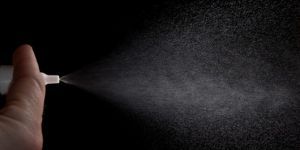Using Esketamine Nasal Spray for Treatment Resistant Depression
A study presented at APA 2019 found that esketamine spray to be an effective, fast-acting treatment for people with treatment-resistant depression.

A study from the 2019 Annual Meeting of the American Psychiatric Association presented data supporting the effectiveness and safety of esketamine nasal spray for treating treatment-resistant depression.
The study, which was one of the key studies that led to the recent Food and Drug Administration (FDA) approval of esketamine nasal spray, found esketamine spray to be an effective, fast-acting treatment for people that have not responded to other depression treatments.
“This trial of esketamine was one of the pivotal trials in the FDA's review of this treatment for patients with treatment resistant depression. Not only was adjunctive esketamine therapy effective, the improvement was evident within the first 24 hours,” said Michael Thase, MD, study author and professor of psychiatry at Perelman School of Medicine at the University of Pennsylvania. “The novel mechanism of action of esketamine, coupled with the rapidity of benefit, underpin just how important this development is for patients with difficult to treat depression.”
Investigators sought to determine the efficacy and safety of switching patients with treatment-resistant depression from antidepressants to flexibility dosed esketamine nasal spray plus a newly initiated antidepressant compared to a newly initiated antidepressant and a placebo nasal spray. A phase 3, double-blind, active-controlled, multicenter study was conducted at 39 outpatient referral centers between Aug. 2015 and June 2017. Investigators enrolled 223 adults with a diagnosis of moderate to severe nonpsychotic depression and a history of nonresponse to at least two antidepressants. The participants were randomized into their groups and 114 were placed into the esketamine group while 109 were randomized into the placebo group.
Participants were randomly assigned to one of two groups. One group was switched from their current treatment to esketamine nasal spray (56 or 84 mg twice weekly) plus a newly initiated antidepressant (duloxetine, escitalopram, sertraline, or extended-release venlafaxine). The other group was given placebo nasal spray and a newly initiated antidepressant. The primary efficacy endpoint for the study was change from baseline to day 28 in Montgomery-Åsberg Depression Rating Scale (MADRS) score.
The mean MADRS score decreased from baseline to day 28, with a greater improvement in the eskatamine plus antidepressant arm as compared with antidepressant plus placebo arm. Authors noted that the response was rapid in onset and increased over time during repeated dosing. Least square mean between-group differences, in favor of esketamine, of -3.3 were observed 24 hours after dosing, -2.9 at day 8, -2.0 at day 15, -3.8 at day 22, and -4.0 at day 28.
Investigators reported that adverse events in the esketamine group generally appeared shortly after taking the medication and resolved within an hour and a half while patients were in the clinic. The most common adverse events were dissociation, nausea, vertigo, dyspepsia, and dizziness. Authors noted that 7% of patients in the esketamine group discontinued the study due to side effects.
In a commentary published in the American Journal of Psychiatry, Alan Schatzberg, MD, of the Stanford University School of Medicine, points out multiple areas where additional information is needed and chronicled his concerns of the potential for abuse.
“Taken together, there are more questions than answers with intranasal esketamine, and care should be exercised in its application in clinical practice,” Scharzberg explained. “Only time will tell how useful it will be. Still, the agent could be helpful to many patients with refractory depression, and efforts to develop rapidly acting agents for severely depressed patients need to be applauded.”
This study, titled “Efficacy and Safety of Flexibly Dosed Esketamine Nasal Spray Combined With a Newly Initiated Oral Antidepressant in Treatment-Resistant Depression: A Randomized Double-Blind Active-Controlled Study,” is published in the American Journal of Psychiatry and was presented at APA 2019 in San Francisco, CA.